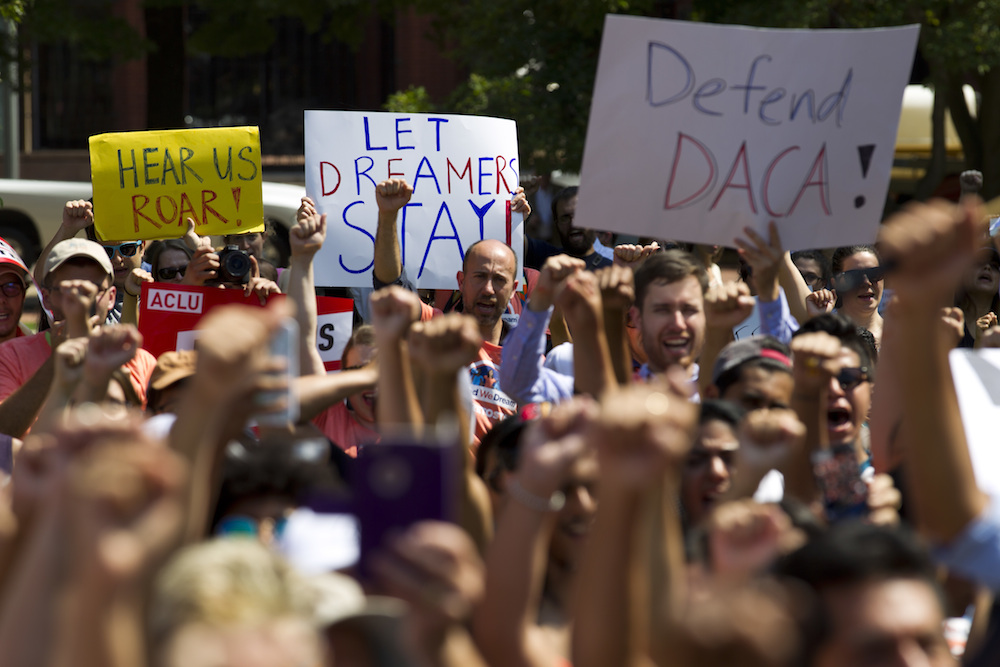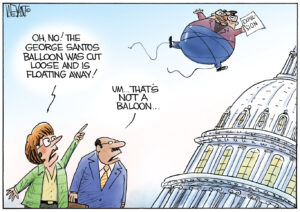Why We Must Fight Trump’s Decision to End DACA
There appears to be no limit to the lengths the president will go to to hurt vulnerable immigrants. Protesters rally in support of Deferred Action for Childhood Arrivals (DACA) outside the White House on Tuesday. (Jose Luis Magana / AP)
Protesters rally in support of Deferred Action for Childhood Arrivals (DACA) outside the White House on Tuesday. (Jose Luis Magana / AP)
President Donald Trump’s insultingly brief tweet early Tuesday morning cryptically declared what many of us had been dreading for weeks. In tweeting, “Congress, get ready to do your job – DACA!” Trump indicated he would indeed end Deferred Action for Childhood Arrivals (DACA), a program initiated by President Barack Obama that allowed young undocumented immigrants to postpone deportation and acquire education and employment in the United States. About 800,000 young immigrants did just that—and their future is now entirely uncertain.
Earlier this year, immigrant rights groups did not consider DACA registrants to be facing a serious threat from the Trump administration, primarily because Trump himself had declared he would deal with the program with “heart.” In December, President-elect Trump told Time magazine, “We’re going to work something out that’s going to make people happy and proud,” adding that DACA recipients “got brought here at a very young age … and they’re in never-never land because they don’t know what’s going to happen.”
He repeated this sentiment during an ABC interview days after his inauguration, saying, “They shouldn’t be very worried. I do have a big heart. We’re going to take care of everybody.” He stressed this yet again during a rambling press conference Feb. 16. “We’re going to show great heart. DACA is a very, very difficult subject for me … you have some absolutely incredible kids,” he told reporters. “We’re going to deal with DACA with heart. … The DACA situation is a very difficult thing for me because … you know I love these kids. I love kids. I have kids and grandkids. And I find it very, very hard doing what the law says exactly to do.”
Despite these declarations of compassion for young “Dreamers,” the name given to undocumented immigrants brought into the U.S. as children, on Tuesday Attorney General Jeff Sessions became the face of DACA’s demise when he followed Trump’s morning tweet with a letter to the Department of Homeland Security. Sessions then gave a speech outlining how and why DACA would end. In his speech, Sessions referred to Obama’s actions as “unilateral executive amnesty.” (Notice that anti-immigrant conservatives rarely bring up President Reagan’s signing of an immigration bill that actually met the definition of amnesty, unlike Obama’s program of deferred deportation.)
Republican talking points on DACA have repeatedly relied on the phrase “executive overreach” to describe Obama’s implementation of DACA, and Sessions continued this trend in his justification for DACA’s rescission. The hypocrisy of such an accusation is astounding coming from an administration that has used its executive authority to unilaterally ramp up immigration enforcement, ban people from entering the country based on their religion, end U.S. participation in the Paris climate agreement, dismantle regulations protecting the public and so much more.
Sessions said in his speech that the timeline for phasing out DACA is based on “the desire of this administration to create a time period for Congress to act—should it so choose.” Trump reiterated this logic later in the day on Twitter, saying, “Congress now has 6 months to legalize DACA (something the Obama Administration was unable to do). If they can’t, I will revisit this issue!” But remember, it was after Congress’ failure to pass the Dream Act (Development, Relief and Education for Alien Minors) that Obama proposed and enacted DACA. Why does Trump think that Congress will act to protect Dreamers years later, unless he knows it can’t or won’t?
While it is tempting to give Obama credit for DACA, he actually had to be pushed into protecting Dreamers in 2012. Young undocumented immigrants risked their lives and status by engaging in relentless political activism for a program like DACA. The victory represented by Obama’s executive order belongs to them, first and foremost, and then to Obama. Now, with one fell swoop, the Trump administration undid their years of hard work, bringing the fate of Dreamers back to square one.
Even if, by some miracle, Republicans in Congress join Democrats in reviving the Dream Act, or some version of it, and actually muster enough votes to pass it, can we really expect Trump to sign such a bill into law? Dismantling DACA was one of the core aspects of his anti-immigrant platform, intended to woo the bigots among his largely white base. He included it during his June 2015 speech in which he first announced his presidential aspirations, saying, “I will immediately terminate President Obama’s illegal executive order on immigration. Immediately.” Despite his subsequent post-election hand-wringing over the fate of Dreamers, there is little chance Trump would put his signature on a DACA-like bill if Congress were to pass it.
In his speech ending DACA, Sessions made clear that the program was being rescinded not just because of the argument of executive overreach, but because the Trump administration and its base are resentful of DACA recipients being able to legally acquire jobs through their status. “The effect of this unilateral executive amnesty denied jobs to hundreds of thousands of Americans by allowing those same jobs to go to illegal aliens,” Sessions said. This logic is in line with other strongly held beliefs among Trump’s base, like the ideas that women are taking jobs from men, blacks and Latinos are taking college admissions from whites and so on.
But it isn’t just Trump and Sessions who own the cruel decision to end DACA. Ten Republican state attorneys general and the governor of Idaho threatened to sue the federal government over DACA and declared Sept. 5 their deadline in an attempt to force Trump’s hand. It is no coincidence that Trump and Sessions announced their DACA rescission on exactly that date. One can speculate that Trump may have made ending DACA a low priority, based on his public flip-flopping over the issue, and that a larger subset of state-level Republican officials pushed him into prioritizing it. The Republican Party as a whole owns the resulting mess.
To be fair, a handful of prominent Republicans like House Speaker Paul Ryan and Sens. Orrin Hatch and Jeff Flake appealed to Trump to preserve DACA in the days before the deadline. But now, with DACA being phased out, the ball is in Congress’ court. Will Ryan, Hatch and Flake lead the way in pushing their party to join Democrats in passing a bill that codifies DACA? Or will they, too, leave 800,000 young people who are de facto Americans by the wayside? How hard will the Democrats fight for Dreamers and their families? These are questions that we as a nation ought to be asking in the wake of DACA’s end.
We must also imagine and expect the worst. 800,000 young people turned over their personal information to the government in exchange for a small measure of security and temporary status. If we thought this administration would never go as far as using that information against the Dreamers to track them down and deport them, we have not been paying attention. There appears to be no limit to the lengths Trump will go to to hurt people of color and vulnerable immigrants. The only ones who stand between Trump and undocumented people as a whole are the rest of us—citizens who have the power to bring the nation to a standstill over every assault this regime inflicts on us, our communities, our Constitution and our rights.
Your support matters…Independent journalism is under threat and overshadowed by heavily funded mainstream media.
You can help level the playing field. Become a member.
Your tax-deductible contribution keeps us digging beneath the headlines to give you thought-provoking, investigative reporting and analysis that unearths what's really happening- without compromise.
Give today to support our courageous, independent journalists.






You need to be a supporter to comment.
There are currently no responses to this article.
Be the first to respond.